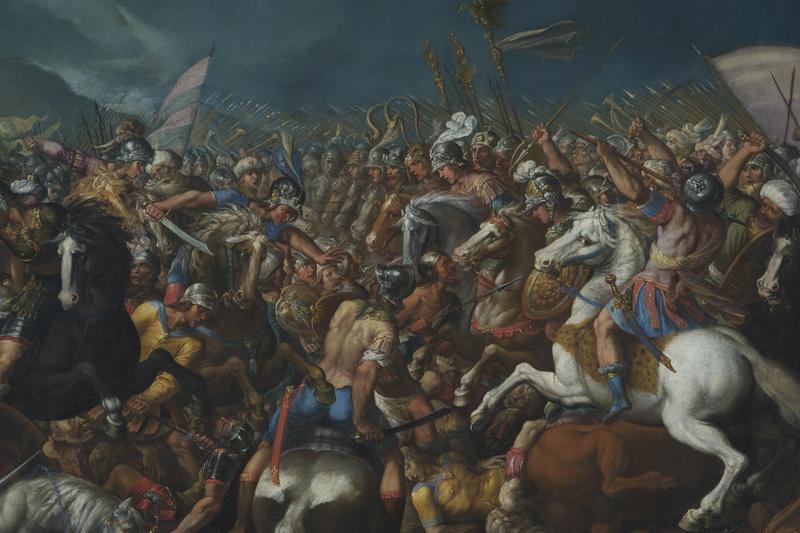Why Did Hannibal Lose?
By | August 30, 2019

If one had to list the great generals of history names such as Napoleon Bonaparte, Alexander the Great, Ghengis Khan, Tokugawa Ieyasu, and Frederick the Great come to mind. Almost always on such lists is the Carthaginian general, Hannibal Barca. He was Rome’s greatest nemesis and won almost every battle, but ultimately lost his war against Rome.
Why?

Hannibal was born in the city of Carthage in 247 BC. Carthage, a city of Phoenician descent on the North African coast had developed into a powerful contender for ultimate power in the Mediterranean basin. It's only rival was the Roman Republic, which had simultaneously been growing in strength.
The Romans and the Carthaginians fought their war over the span of 23 years from 264 to 241 BC. Carthage lost the war and was forced to give up territory in Sicily as well as pay a heavy indemnity to Rome. At the end of the war, civil disruption in Carthage allowed the Romans to take further advantage of their rivals and take the islands of Corsica and Sardinia from them.

This type of old school power politics breeds bad blood, and the Carthaginians tried to pick up the pieces. General Hamilcar Barca led a recovery of Carthage through the conquest of much of Iberia (modern-day Spain) before he died in battle in 228 BC. Hamilcar’s son was Hannibal. There is a legend that Hamilcar made his son swear an oath of eternal hatred toward Rome at the altar of the god Baal.

Hannibal took charge of Iberia in 221 BC. According to agreement and treaty, the Romans would leave Iberia to the Carthaginians as long as they paid tribute and stayed in certain areas. However, in 219 BC, the Romans, probably fearing the renewed power of Carthage, carried off a coup in the city of Saguntum and installed a government friendly to Rome and hostile to Carthage.
Saguntum was within the agreed Carthaginian sphere of influence so Hannibal laid siege to and took it. Rome, outraged, demanded that the Carthaginian government hand over Hannibal. Carthage refused and their second war began. This war would be known as the Second Punic War, with Punic being a derivative word from Phoenician, who were the ancestors of the Carthaginians.

Hannibal opted to bring the war to directly to Rome. In what was an audacious scheme, he marched his army of 50,000 infantry, 9,000 cavalries, and about 40 war elephants across southern Gaul (modern France) and to the foothills of the Alps. Leaving behind provisions and siege engines, he made a 17-day crossing against harsh climate and hostile natives. When he emerged on the other side in Italy proper his force was reduced to 26,000 men and only a few elephants.

The Romans, however, were unaware of Hannibal’s movements, thinking he was still in Iberia. When they found out, they quickly sent a force under the command of Publius Cornelius Scipio to intercept them. The two forces met at the Ticino River in mainly a cavalry battle. Hannibal won and Scipio nearly lost his life.
Hannibal followed this up with major victories at Trebia, Lake Trasimene, and the greatest one at Cannae in which he annihilated 16 Roman legions of about 80,000 men. Each one of these battles is worthy of its own separate article and has been the subject of numerous studies. The key to understanding Hannibal is that he was a master of the feint and of the double envelopment strategy in which he was able to with a smaller, but faster force, conduct simultaneous attacks on the flanks of a foe.

Hannibal’s political strategy was straightforward but flawed. He was to win battles and get cities in Italy to switch their loyalties to Carthage. After Cannae, he succeeded in getting almost half of the cities in Italy to switch sides allowing Hannibal to have much control of southern Italy. Hannibal, however, would not march on Rome immediately. It is said that one of Hannibal’s officers said to him, “Assuredly, no one man has been blessed with all God's gifts. You, Hannibal, know how to gain a victory; you do not know how to use it.”
The plan did not work since Hannibal’s war strategy was different than that of the Romans. The Romans looked for total war and destruction of its opponent at all costs, while Hannibal wanted to bring them to the negotiating table. There was to be no peace and the Romans feared to engage Hannibal in a large scale battle in Italy again. Rather, they relied on skirmishing strategies to wear the Carthaginians down. The Romans relative to Hannibal had nearly limitless manpower at their disposal and could win a war of attrition. Meanwhile, the Carthaginian senate did not send needed supplies and war engines in order for Hannibal to fabricate a total victory or lay siege to Rome.

Slowly, the Romans regained control of the defecting cities and then under the generalship of Publius Cornelius Scipio, the son-in-law of the same name as the general defeated at the Ticino River, launched attacks on Iberia and North Africa. Scipio would become known as Scipio Africanus because of the victories he won in the Carthage homeland.
Carthage recalled Hannibal to fight Scipio. The two met in 202 BC at the Battle of Zama which was a close-fought battle but resulted in Hannibal’s loss.

Hannibal first retained his title and held power in Carthage. However, he soon found that his enemies within Carthage denounced him to Rome. Hannibal fled to the east in exile with the Romans hunting for him. Hannibal ultimately chose suicide in 181 or 183 BC rather than suffer capture. Ultimately, Carthage was completely destroyed by Rome at the end of a Third Punic War from 149 to 146 BC.
Hannibal ultimately makes for a tragic anti-hero of the ancient world. A great figure that you cannot help but pity. For all his gifts and all his audaciousness, Hannibal’s flaw was that he only looked at the battle, not the war.
This overview article is merely an introduction to Hannibal and one of the most epic dramas of the ancient world. For more, one of the best books on this subject is the Ghosts of Cannae by Robert L. O’Connell -- highly recommended for those of you who are Second Punic War geeks like me.

